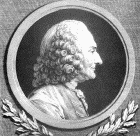
Jean-Philippe Rameau
Jean-Philippe Rameau (1683-1764) was an almost exact contemporary of Johann Sebastian Bach (1685-1750), and was the greatest French musician and music theorist of his day. Today, while his name is widely known, his music isn't.
In fact the entire French baroque, populated by such names as Couperin, Lully and Rameau is the stuff of specialist interest only, their music rarely heard, their fame eclipsed by their German (Bach, Handel) and Italian (Scarlatti, Vivaldi) cousins.
Why is this the case? Why do we revere Bach and forget Rameau?
The story of Rameau really starts with the inventor of the French opera, Jean-Baptiste Lully (1632-1687). Lully was a social climber, ruthless in his ambition to please King Louis XIV. He wrote grande operas based on mythological themes, with thinly disguised plots to flatter the king. His work was loved by the public and the King, and Lully's fortune was made.
Rameau was Lully's successor. Early in his life he made his way as an organist and harpsichord teacher. His works for harpsichord were extremely popular, and every piano student today has played Rameau's pieces.
Rameau came to opera late - he wrote his first aged 50. He continued the traditional French opera style of Lully; grand mythological themes, exaggerated tragedy and comedy, expressive choral writing.
His wrote straight operas such as
Castor and Pollux,
Dardanus, and
Les Boreades, opera-ballets such as
Zais and straight ballets such as
Pygmalion, all of which were huge successes.
Rameau took the genre and advanced it into the late baroque. His texts were sensitive, his dances lively and his harmonies progressive and often surprising. After all, he was also the author of several books on music theory and harmony, and regarded his theoretical works as important as his compositions.
Near the end of his life he became embroiled in the
“Querelle des bouffons”, a war of words between the French traditionalists and those who favoured the new Italian opera style.
Of course, the Italian style won the day. Handel even travelled to Italy to study it and bring it back to Germany and England. Rameau's music was forgotten.
Times were changing. Revolutions were breaking out over Europe and America. Monarchy became a dirty word. People ignored the past and vast themes, and looked within themselves for inspiration. Grandiosity was no longer fashionable.
Most of western music after 1750 sprang from Bach, Handel and the German crowd. Most of the music we listen to now had its framework founded with that tradition, so it sounds familiar, logical. The little splinter of French baroque withered and begot not heirs, so it sounds a little odd, a little out of place.
But it is fascinating to go back to that time. Its very uniqueness is its attraction. Rameau's music is of the frilled collar and powdered wig. It is everything - delicate, obscene, sentimental, comic. Most of the time it is over-the-top. Its a lot of fun.
For every opera and ballet he wrote, Rameau wrote an overture, and he was the first to relate the overture to the subject of the major work, either in tone, or theme. So we get a little miniature of the whole opera in just the exquisite overture.
This week's CD features 17 Rameau overtures, played on original instruments, by the Rameau revival group
Les talens lyriques. They encapsulate everything that Rameau wrote in his orchestral works, and excellent introduction to this lost branch of music.
It may take a few listenings - after all, this is slightly unfamiliar music. But the melodic inventiveness and harmonic brilliance begins to shine. Its slightly quirky but really, really good. They sure knew how to have fun in the court of the Sun King.
Please support Good-Music-Guide.com
by purchasing this CD using this link.

Track Listing
Rameau
Overtures from Operas
Les talens lyriques
Christophe Rousset
Ouvertures
- Les Fetes de Polymnie
- Les Indes galantes
- Zais
- Castor et Pollux
- Nais
- Platee
- Les Talens lyriques (Les Fetes d'Hebe)
- Zoroastre
- Dardanus
- Les Paladins
- Hippolyte et Aricie
- Le Temple de la Gloire
- Pigmalion
- Les Surprises de l'Amour - Prologue
- Les Fetes de l'Hymen de l'Amour, ou Les Dieux d'Egypte
- Les Surprises de l'Amour - Acte I (L'Enlevement d'Adonis)
- Acante et Cephise, ou La Sympathie